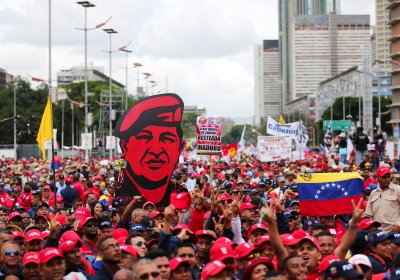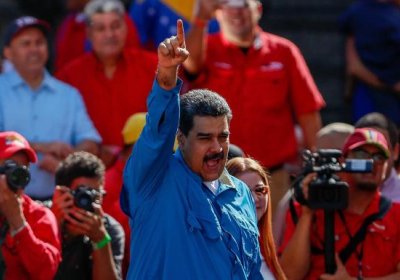Venezuelan President Nicolas Maduro has come out strongly against United States President Donald Trump’s latest sanctions on the South American country. These prohibit “all transactions” with “any digital currency” issued by the Venezuelan government — alluding to the cryptocurrency promoted by the Venezuelan authorities, known as “Petro”.
Venezuela
The United States administration has stepped up its efforts at “regime change” in Venezuela in recent weeks.
Much has been made in the corporate media of a humanitarian crisis on Venezuela’s borders having been caused by a flood of refugees leaving the country.
Here, Joe Emersberger takes down a recent example of the kind of crude propaganda that the corporate media has been running in its campaign against Venezuela.
Venezuelan Foreign Minister Jorge Arreaza said US-imposed sanctions are making foreign debt renegotiation more difficult and that the government would look to work with other countries to alleviate their needs.
Pacha Guzman, a leading activist with the Venezuelan-based Ezequiel Zamora National Campesino Front (FNCEZ), is touring Australia in March. Guzman will be visiting various cities where she will address public forums and meet with trade unions, politicians and solidarity organisations.
The FNCEZ is Venezuela’s largest peasant-based organisation and a member of La Via Campesina and the Latin American Coordinator of Campesino Organisations.
The situation was bleak for Venezuela’s pro-poor Bolivarian Revolution in the first half of last year.
With a dire economic situation and a growing wave of violent opposition protests, President Nicolas Maduro turned the tables by convening a National Constituent Assembly (ANC) in July.
Venezuelan workers’ organisations have denounced illegal arrests, firings and persecution in the Lacteos Los Andes state-run dairy company and private Venevision TV station. Meanwhile, campesino (peasant) leaders in Barinas state were freed and authorised to return to their land after persecution by an ex-land owner.
With the National Electoral Council setting April 22 as the date for the country’s presidential election and the United Socialist Party of Venezuela (PSUV) confirming current president Nicolas Maduro as their candidate, leftist organisations in Venezuela have been debating what position to take.
As Venezuelans get ready for April’s presidential election, US Senator Marco Rubio claimed via Twitter the world would support Venezuela’s military if it decided to orchestrate a coup against Venezuelan President Nicolas Maduro, who is up for re-election.
The Republican lawmaker from Florida tweeted on February 9: “The world would support the Armed Forces in #Venezuela if they decide to protect the people & restore democracy by removing a dictator.”
Venezuela's presidential elections have been set for April 22 as talks between the government and opposition aimed at promoting peace and unity appeared to crumble.
US Secretary of State and former CEO of oil giant Exxon Mobil Rex Tillerson has threatened Venezuela with a ban on oil exports, only days after hinting that the country’s president, Nicolas Maduro, could be overthrown by a military uprising.
Describing Venezuela’s armed forces as a possible “agent of change”, Tillerson suggested on February 1 that the military could “manage a peaceful transition” should they remove Maduro from office.
Venezuela’s National Constituent Assembly (ANC) has approved a proposal to hold presidential elections before April 30.
The move came a day after the European Union announced sanctions targeting seven Venezuelan senior state officials on January 22.
- Previous page
- Page 13
- Next page











